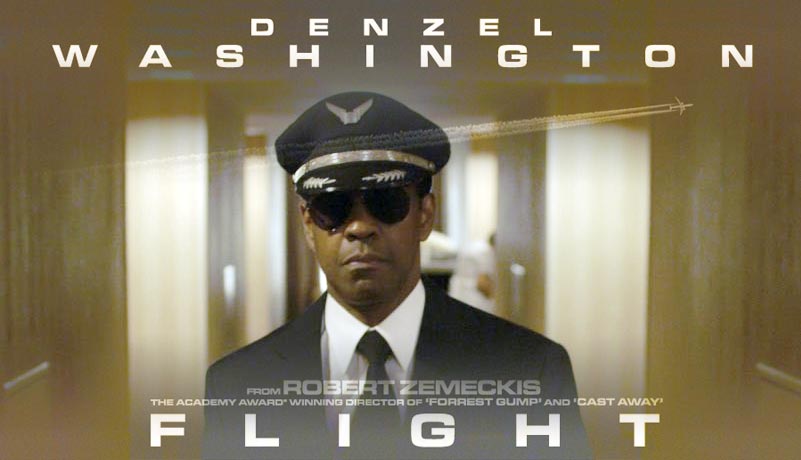Under the wing of Steven Spielberg, Robert Zemekis began his
legacy in the 80’s with family oriented special effects movies like “Back to
the Future” and “Who Framed Roger Rabbit”. His carreer expanded into the 90’s
where he began to make different kinds of movies like “Death Becomes Her” and
“Forrest Gump”, which of course won the best picture award. Unfortunately, since he has discovered the
art of motion capture animation in the 2000’s—exclusively making tech-demo,
kid-flicks like “The Polar Express” and “The Christmas Carol”--Zemeckis’s
unique point of view has been fading, resulting in films that may be
technically impressive, but are rather bland and banal compared to his classic
work. With his most recent film “Flight”
Zemeckis returns to directing human beings in a non CGI world and dives nose
first back into deep character work, creating maybe his best film since Gump back
in 1994.
“Flight”
tells the story of a Whip Whitaker (played by Denzel Washington), a commercial
airline pilot who has a penchant for self-destructive drinking and drug use.
One morning a malfunction causes his plane to drastically drop in altitude.
Whitaker wakes up out of his discreet hangover and is able to safely crash the
plane into a field, saving most of the lives of those on board—leaving only 6
dead. When he awakes, he is immediately
thrown into a media blitz where he is being hailed as a hero and genius. At the
same time, he is quietly fighting accusations by his company’s insurance
lawyers that he may have been intoxicated while flying.
Everything
that I have described above is what you can see in the trailer, and on a
surface level that’s the general plot of the movie. However, what the trailers
hide is that this is a very reflective and thorough character study about
addiction, denial, and self-betrayal—exploring the fact that being gifted
doesn’t always make you a role model. The plane crash sequence is really the only major
special effects moment in the movie, and as exciting as it is, it happens
within the first 20 minutes. What follows are the day-to-day experiences of a
man who is defeated by his own demons, struggling to pull it together when he
needs to more than ever before. Another major plot point, completely eluded
from the trailers, is a subplot dealing with a heroin addicted love interest
named Nicole (Kelly Reilly),
who decides to kick her habits in face of Whip’s insurmountable compulsions.
Though
there is a wonderful and eclectic supporting cast, including John Goodman, Don
Cheadle, and Bruce Greenwood, this movie is basically an actor’s platform for Denzel
Washington, exploring the depths of what he is emotionally able to capture. The
movie completely succeeds at doing this as he must convincing play drunk,
sober, sad, arrogant, regretful, and charming, all at the same time—sometimes
within the same scene. It’s a high water
mark for a well-vetted actor who’s had many other notable career moments, and
it’s sure to garner him with some award consideration.
Where
the movie occasionally deflates for me is when the center of consciousness
shifts a bit too much from Washington. There are vague allusions to spirituality
and religion that are never fully earned or integrated as a valid theme, often
feeling shoehorned into the narrative. The b-plot with his heroin-girlfriend
also seems somewhat distracting when it’s there and eventually drops out of the
story all together, as if the movie itself knew that it wasn’t really working. Also,
the moral messaging is laid on a bit too thick by the end of movie, when its
themes have already been made abundantly clear by the actions of Washington’s
character. But even when it fails it does so with the good intensions, leaving
the movie a tolerable 20-30 minutes too long.
The
lesson that should be learned from “Flight” is that motion capture characters can
never show real expressions or convey real emotions better than just pointing a
camera at an actor and letting him/her be in the moment. It was never the technology behind “Back to
the Future” or “Rodger Rabbit” that kept us watching those films over and over.
Movies are about connecting with the characters and being successfully
transported into their stories. In this regard, though it’s not without its
imbalances and a misgiving, “Flight” shows Zemeckis finally on the right
trajectory.
Grade: B+
Originally published in The Basic Alternative/Dec-2012

No comments:
Post a Comment